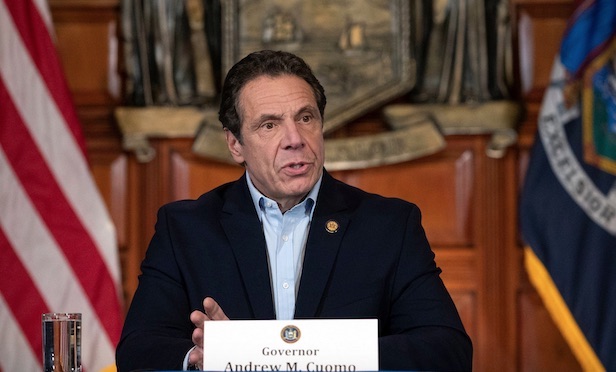 Gov. Andrew M. Cuomo announces agreement on the FY 2020 state budget at the state capitol, March 31, 2019./ Photo by Mike Groll (Office of Gov. Andrew M. Cuomo)
Gov. Andrew M. Cuomo announces agreement on the FY 2020 state budget at the state capitol, March 31, 2019./ Photo by Mike Groll (Office of Gov. Andrew M. Cuomo)
NEW YORK CITY—The $175 billion FY 2020 budget for the state of New York passed Sunday night. Highlights of the budget focused on real estate issues include the following key points:
In an attempt to soften the effects of the federal government's elimination of the SALT (state and local tax) deductions, the legislature passed a permanent 2% property tax cap. It also lowered the middle-class tax rates for New Yorkers earning up to $300,000. But Governor Andrew Cuomo vows he has not given up efforts to combat the loss of the SALT deductions in future federal tax filings.
“I've been speaking with Speaker Pelosi and I will continue this fight, which I believe is the most important fight for the state of New York until we get it done,” says the governor.
The lawmakers gave the green light for congestion pricing with New York being the first state in the US with such a system. Similar plans are in place in other cities around the world including Singapore, Stockholm and London. Cuomo explains the plan is designed to reduce traffic congestion and raise revenue.
Vehicles entering the Central Business District defined as 60th Street and below will need to pay a toll using electronic boxes. Revenues raised will be divided with 80% going to the Metropolitan Transportation Authority, 10% to the Long Island Rail Road and 10% to the Metro-North Railroad. How much will be charged and which drivers will be exempt from paying the tolls will be decided at a later date by the Triborough Bridge and Tunnel Authority and a separate new, traffic review board.
In addition, the MTA will be reorganized to achieve greater efficiency with capital projects and greater accountability. Instead of separate corporations run under the MTA acting as a holding company, the MTA will be consolidated.
Also, the proposal for the pied-à-terre tax on second homes valued at $5 million was jettisoned. In its place, Albany passed a mansions tax that the state will levy at the sale of multimillion dollar homes. The New York Post explains that the system creates seven tiers, starting with a 1.25% tax for homes selling between $2 million and $3 million, with taxes progressively rising up to 4.15% for homes valued at $25 million or more. The article notes StreetEasy.com explains the mansion tax is usually paid by the buyer within 15 days of closing.
Finally, the budget also allocates $20 billion to an affordable housing plan, the largest in the state's history.
The governor comments that the budget was difficult. “But the hard ones are the good ones, by definition. It's easy to leave the hard issues on the side. It's easy. And that's why they are hard issues. Because they were put aside year after year, after year, after year,” says Cuomo. “Because nobody wanted to pick them up. Because they were controversial and hard. We are here to do the hard ones, because those are the ones that need to be achieved.”
© Touchpoint Markets, All Rights Reserved. Request academic re-use from www.copyright.com. All other uses, submit a request to [email protected]. For more inforrmation visit Asset & Logo Licensing.







